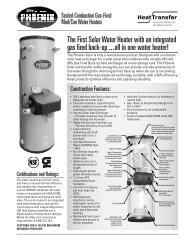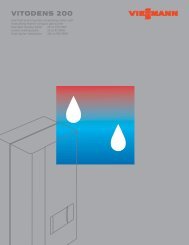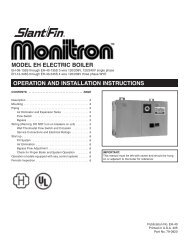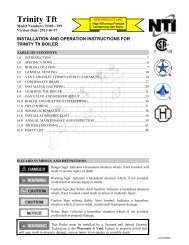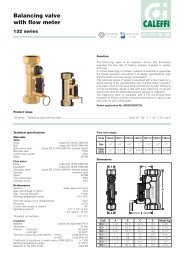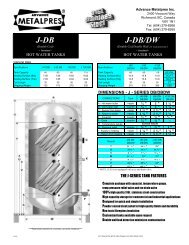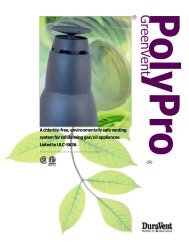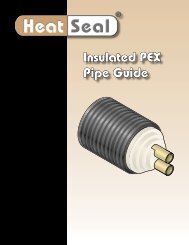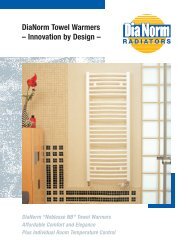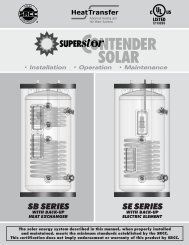Apricus Solar Water Heating System Installation and Operation ...
Apricus Solar Water Heating System Installation and Operation ...
Apricus Solar Water Heating System Installation and Operation ...
Create successful ePaper yourself
Turn your PDF publications into a flip-book with our unique Google optimized e-Paper software.
<strong>Apricus</strong> <strong>Solar</strong> Collector <strong>Installation</strong> & <strong>Operation</strong> Manual - USAProduct Name: DOWFROST* Heat Transfer Fluid Issue Date: 11/05/20079. Physical <strong>and</strong> Chemical PropertiesPhysical StateColorOdorFlash Point - Closed CupFlammable Limits In AirAutoignition TemperatureVapor PressureBoiling Point (760 mmHg)Vapor Density (air = 1)Specific Gravity (H2O = 1)Freezing PointMelting PointSolubility in <strong>Water</strong> (byweight)pHKinematic ViscosityLiquidColorlessCharacteristic104 °C (219 °F) Pensky-Martens Closed Cup ASTM D 93 (based onmajor component), Propylene glycolLower: 2.6 %(V) Literature Propylene glycolUpper: 12.5 %(V) Literature Propylene glycol371 °C (700 °F) Literature Propylene glycol2.2 mmHg Literature152 °C (306 °F) Literature .>1.0 Literature1.05 20 °C/20 °C LiteraturesupercoolsNot applicable to liquids100 % Literature10.0 Literature43.4 cSt @ 20 °C Literature10. Stability <strong>and</strong> ReactivityStability/InstabilityStable under recommended storage conditions. See Storage, Section 7. Hygroscopic.Conditions to Avoid: Exposure to elevated temperatures can cause product to decompose.Generation of gas during decomposition can cause pressure in closed systems. Avoid direct sunlightor ultraviolet sources.Incompatible Materials: Avoid contact with: Strong acids. Strong bases. Strong oxidizers.Hazardous PolymerizationWill not occur.Thermal DecompositionDecomposition products depend upon temperature, air supply <strong>and</strong> the presence of other materials.Decomposition products can include <strong>and</strong> are not limited to: Aldehydes. Alcohols. Ethers. Organicacids.11. Toxicological InformationAcute ToxicityIngestionLD50, Rat, female 20,300 mg/kgSkin AbsorptionFor similar material(s): LD50, Rabbit > 10,000 mg/kgRepeated Dose ToxicityIn rare cases, repeated excessive exposure to propylene glycol may cause central nervous systemeffects.Chronic Toxicity <strong>and</strong> CarcinogenicitySimilar formulations did not cause cancer in laboratory animals.Developmental ToxicityFor the major component(s): Did not cause birth defects or any other fetal effects in laboratoryanimals.Page 4 of 7Copyright 2011 – <strong>Apricus</strong> Inc Doc: A7-05.4.1.4-PB-1.9 Page 111 of 126



